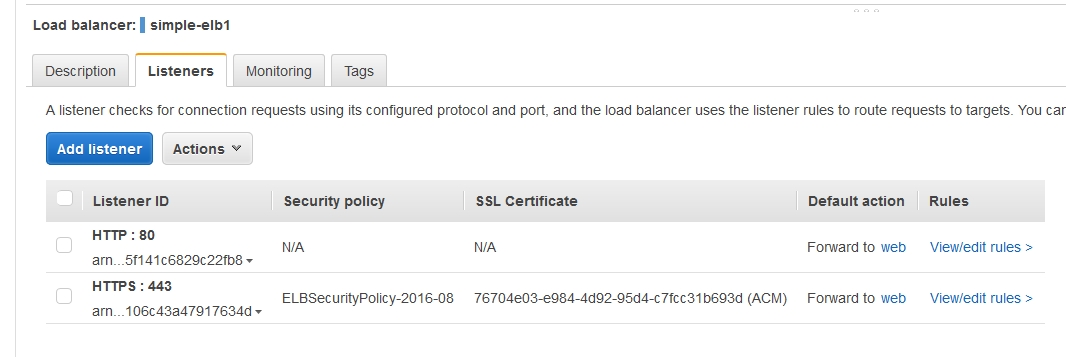
In this post I will cover how to use AWS to host dynamic content with a free AWS SSL cert. Not much background, the reason I did this is I had a static website I wanted to move to having some light dynamic content without having to switch up hosting too much. Doing this with static content is easier and mostly well known (just upload to S3 and cloudfront, good to go):
Route53 SSL->AWS CloudFront -> S3 bucket set to hosting
Even with purely static content, this worked OK until I tried clicking on a link (foo.com/bar/baz) which S3 blew up as a bucket identifier, since it does NOT have a file structure. I immediately decided to scrap that idea and just do some actual webhosting.
You cant set a service alias in route53 directly to an EC2 instance (I didnt check EBS but..), The trick is essentially this:
Route53 SSL -> EC2 elastic load balancer -> target group forwarding BOTH HTTP And HTTPS to EC2 HTTP port 80
The load balancer listeners look something like this:

The 'web' target group port is set to 80, protocol HTTP and has our EC2 instance in it. If you care about health checks, you will need to tweak it to accept a 301 or https.
On the EC2 a normal nginx installation serves up the content normally. Only a minor tweak for redirecting non https is added:
# in your server block:
proxy_set_header X-Forwarded-Proto $scheme;
if ($http_x_forwarded_proto != 'https') {
return 301 https://$host$request_uri;
}
With all that done I wrote a helper script to build the site and shoot it to the webroot over scp. If you're using debian/ubuntu based distro, nginx will be using www-data, so you can set permissions like so:
sudo chown -R "$USER":www-data /var/www/html
sudo chmod -R 0755 /var/www/html
Currently I'm still just using hugo to mostly kick out a static site. To easily rebuild the hugo site and shoot it up:
$ hugo
#pull these values out if you want to run ssh commands after scp (permissions etc)
$ key=your_pem_here.pem
$ host=foo@bar.com
$ scp -i $key -r public/* $host:/var/www/html
Hope this saves anyone else that needs to similar some time and money.